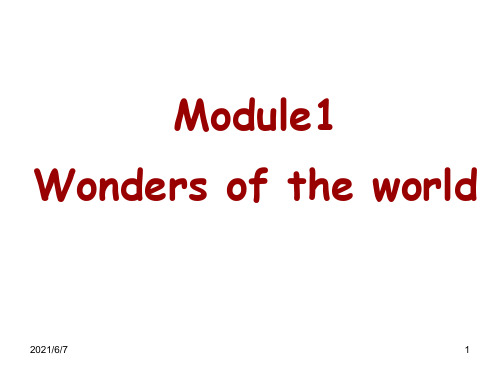外研社初三英语module 1 Wonders of the world课件
- 格式:doc
- 大小:56.00 KB
- 文档页数:10












Module 1 Wonders of the world1.in one’s opinion表示“按某人的意见;据某人看来”。
2.though 作连词, 意为“虽然; 尽管”, 常用来引导让步状语从句, 从句可放在主句前或主句后, 但不能与but 或however 出现在同一个句子中。
3.go through 通过,穿过;经历e.g. The rain has gone through my coat.The country has gone through too many wars.◇拓展:go 相关词组go abroad 出国go against 违背;与……不符go up 增长;上升;被兴建起来go on 继续;继续下去;发生go over 复习;仔细审查;走近go ahead 进行go away 走开;消失go for 去取来;争取得到4.拓展:look 相关词组look after 照料look back 回顾,向后看look in 顺便来访look into 调查look through 浏览look over 翻阅;调查look up 找出,查阅;仰视look down upon sb. 轻视某人look forward to doing 期待5.remain v.逗留,留下n.剩余物;遗迹;残骸e.g. I didn’t remain long in the city. 我并没有在那个城市逗留很久。
The police told everybody to remain in their cars. 警察叫大家都留在车里。
6.词语辨析 arrive,reach与get的区别◇ arrive 是不及物动词,后接介词in/at+地点名词。
一般来说,到达大的地方用in,到达小的地方用at.They arrived in Beijing at ten.我们将于10点到达北京。
◇ reach 是及物动词,后面可以直接接宾语He reached the village at night.他在夜里到了这个村庄。
◇ get 是不及物动词,其后接介词to.David often gets to school at seven.大卫经常7点到校。
◇注意:(1)当这些词后接副词home, here, there等时,不加任何介词。
When did you arrive/ reach/ get home?你是何时到家的?(2) 三个词中,只有arrive可单独使用,后面不接介词和宾语。
When he arrived, the train had left.但他到达时,火车已经离开了。
7.at that time(那时),at that moment(当时)8.get out of 意为“从。
内出来,离开”上小汽车用get in (into),下小汽车用get out of,而乘火车、公共汽车、飞机等用get on, 反义词为get off.◇get in 进入 get to 到达get on 上(车等) get off 下(车等)9.词语辨析through, across与cross的区别◇(1) through 是介词,表示从一端到另一端,它表示的动作是在内部空间进行的。
The thief got in through the window.小偷是通过窗户进来的。
◇(2) across也是介词,强调从一定范围的一边倒另一边,且指在物体表面上或沿着某一条线的方向而进行的动作,常和表示移动的动词(walk ,run, fly, jump 等)连用。
Go across the bridge, and you’ll find the park.走过这座桥,你就会找到公园。
◇(3) cross 是动词,表示“穿过;越过;渡过”。
Be careful when you cross (=walk across) the street.过街时你要当心。
10.near, by,与beside 的区别◇(1) near 意为“在。
附近”,距离不远,但比beside和by远。
There is a supermarket near our school.我们学校附近有一家超市。
◇(2) by 意为“在…旁边”,比near更近,还有“依;靠;沿着”等含义。
表示在“在某人旁边时”则多用beside.I’m sitting by the window.我靠窗坐着。
◇(3) beside 意为“在…旁边”,指两者位置关系时,相当于next to. There is a tall tree beside the house.房子旁边有一棵大树。
(指房子侧面,不指房前房后。
)11.go the right way “走对路”,way 意为“路线”◇拓展记忆:go the wrong way=go wrong 走错路lose one’s way 迷路Make one’s way to 前进;朝…走Don’t stand in the way.不要挡路12.词语辨析reply 与answer的区别两词都可作动词和名词。
◇reply 作动词时,较正式,指经过思考后一一答复,常用于结构reply to sb./ sth.. 表示“对某人/某事做出回答”。
He failed to reply to my question.他没能回答我的问题。
◇answer 作动词时,可直接接宾语,还可表示对电话、敲门等做出的应答,而reply则不能You must reply to/ answer this letter right way.你必须马上回复这封信。
Who answered the telephone?谁接的电话?(不能用reply)◇answer 与reply后面都可接that从句,两者可以互换。
He answered / replied that he knew nothing about it.他回答说他对此事一无所知。
13.look over “从…上面看”The old man looked over his glasses.这个老人从他的眼镜上方看过去。
◇look over 还可表示“仔细检查;翻阅”。
I looked over my notes before the exam.考试前我翻看了一下我的笔记。
14. look for 寻找look after 照顾look out 当心;注意look up 查询;向上看look around/ round 四处看看;浏览15.fall 的过去式、过去分词分别是fell, fallen.◇fall away 消失 fall down 跌倒,倒下,下降The sun falls away behind the mountains.太阳消失在山的后面。
◇拓展记忆fall off 跌落I fell off my bike and hurt my leg badly.我从自行车上掉了下来,把腿摔得很严重。
◇fall behind 落后,跟不上。
You must study hard, or you’ll fall behind others.你必须努力学习,否则你就落后于别人了。
16.词语辨析 rise 与raise的区别rise意为“上升,起身”,为不及物动词,过去式、过去分词分别为rose ,risen.He rose early this morning.今天早晨他起床很早◇raise 意为“举起;召集;筹措;抚养”,为及物动词,过去式‘过去分词分别加-ed.◇raise one’s hand 举手raise an army 招募军队raise a family 养家17.below 与under 的区别◇below 指位置低于某物或在某物的下方,但不一定在某物的正下方,反义词为above◇under 指在正下方,反义词是over.表示年龄大小或数量的多少时,两者可通用。
He is below/ under fifty.他不到50岁。
18.on the edge of “处于…的边缘”介词还可用at 例如:at the water’s edge 在水边one of 意为“…之一”作主语时,谓语动词必须用单数形式. One of them has come.他们中的一个已经来了。
◇当one of …其后接形容词时,通常用形容词的最高级This is one of the most interesting films this year.这是今年最有趣的电影之一。
19.look down 意为“俯视,向下看”。
其反义词为look up “仰视;向上看”。
拓展记忆:look down on sb./sth. 轻视,瞧不起某人/某物look up to sb. 尊敬/仰慕某人20.拓展记忆this side up 此面朝上side by side 并肩;并排on all sides= on every side 到处,在各方面look across 意为“向对面看”I looked across to the other side of the river.我向河的对岸望去21.rise-rose-risen v. 升起22.light n. ①光,光亮②灯◇补充:light v. 点燃;照亮light – lit/lighted – lit/lightedWe lit the candle and the candle lit the whole room.我们点着了蜡烛,蜡烛照亮了整个房间。
23.appear vi. 出现disappear vi. 消失24.look over 从……上面看过去look over 检查25.clear v. ① (云或雾) 散开②打扫干净① The fog cleared and we saw the whole towerin the end.雾散了,我们终于看见整个塔了。
② I have to clear the snow in front of the door before I go out.我出门前得把门前的雪打扫干净。
clear adj. 清晰的We should keep clear minds.我们必须保持清晰的头脑。
26.look across 向……对面看look up 向上看;查阅(字典等)look to one’s left/right 向……左右看look down 向下看;瞧不起look for 寻找look after 照顾27.call【用法】v. 叫做,名为;打电话call on 拜访某人call at 拜访某地call for 需要……28.wonder【用法1】n. 奇迹,奇观【例句】The Great Wall is a wonder of the world. 万里长城是世界奇观。